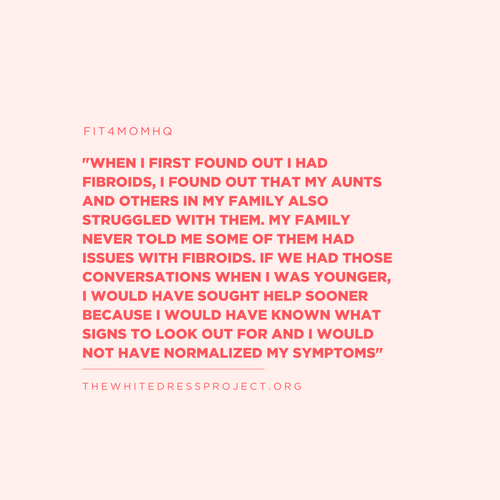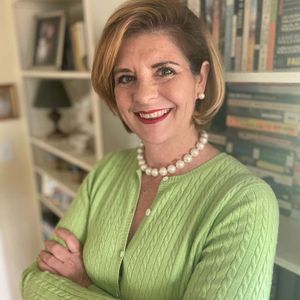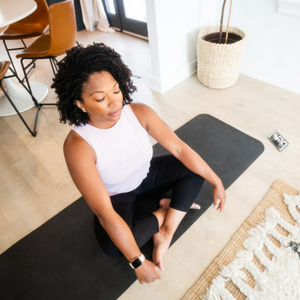*You are not alone. Our blog series, Motherhood Untold, tells the stories of real moms navigating the real challenges and struggles of motherhood.

Motherhood Untold: Uterine Fibroid Awareness
FIT4MOM
July is Fibroid Awareness Month, an initiative created to draw attention to uterine fibroids, a condition that creates challenges for millions of women around the world. As women, we tend to be private about medical issues, but the more we raise awareness around women's health issues, the more we can fund research and help women heal.
According to the Mayo Clinic, "Uterine fibroids are noncancerous growths of the uterus that often appear during childbearing years. Also called leiomyomas (lie-o-my-O-muhs) or myomas, uterine fibroids aren't associated with an increased risk of uterine cancer and almost never develop into cancer."

Many women have uterine fibroids sometime during their lives. In fact, according to The White Dress Project, 90% of black women and 70% of white women will be diagnosed with fibroids by age 50. Sounds crazy, right? These numbers are so high because many women who have fibroids don't have any symptoms and never even know! In those that do, symptoms can be influenced by the location, size and number of fibroids. Symptoms include heavy menstrual bleeding, menstrual periods lasting more than a week, frequent urination, and more. You can find a more comprehensive list of symptoms and risk factors here. If you have concerns or are experiencing symptoms, please reach out to your OBYGN and discuss your concerns!
We had the opportunity to chat with San Diego mama Kia Edwards about her experience with uterine fibroids and how it's affected her as a woman and mother. This is her story.

Kia's Story
I am a native San Diegan. Post high school I attended Historically Black University - Clark Atlanta University with a Bachelors in Communications. I later pursued a Masters's in Education Management, a Post Baccalaureate Certification in Human Resources Management, and a Workplace Diversity and Inclusion Certificate.
Over the past ten years I have been in HR Training and Development which is what influenced me to pursue entrepreneurship during the pandemic - Champion Instructors Education and Training. My company solves diverse online course development to businesses who need to train staff and we create customized courses for entrepreneurs who desire to sell their subject matter expertise.
I believe what makes me unique is my advocacy around issues impacting marginalized communities. One particular initiative I am passionate about are the health disparities around diagnosing and treating uterine fibroids. Black women are two times more likely to develop uterine fibroids which are benign tumors that grow in and on the outside of the uterus (womb). Unbeknownst to me - I learned about my fibroids after experiencing painful abdominal pain on my honeymoon. After months of assessments and evaluations, I decided to keep a food and pain diary which finally led my PCP to order a vaginal ultrasound. This is where my fibroid's journey began!
After receiving a myomectomy (invasive surgery to remove uterine fibroids) I was given the fast track to starting conception in hopes of getting ahead of any new fibroid growths as they can compromise fertility and cause miscarriages. From the onset of a fibroid diagnosis - through fertility support, I would say my husband and I experienced a roller coaster of emotions and stress. I often worried about not knowing sooner about my diagnosis of fibroids and how he may have felt about me possibly being infertile. I also struggled to understand why more women had not talked about fibroid symptoms like heavy menstrual cycles, abdominal pain, anemia, and so much more. I found my journey was very common but not openly discussed.
Thankfully, I was able to conceive and didn't have just one, but two miracle babies, and through diet and lifestyle changes - I have been able to keep returning fibroids extremely small and painless. What I would want others to know is that sharing your story is advocacy. It's an opportunity to educate others and hopefully help in getting women an early diagnosis with less invasive treatments that can sustain the uterus and fertility. Ask the women in your family if they have had any reproductive health issues. Voice concerns during OBGYN visits that mirror fibroids symptoms (painful intercourse, heavy bleeding, miscarriages, abdomen bulge, back pain, frequent urination, etc.). Know that constant heavy bleeding could cause an enlarged heart causing further health issues.
I challenge men to partner with their spouses about their reproductive health. The more they know - the more they are able to help support women in the workforce as we face hundreds of dollars in doctor visits and loss in wages for taking time off to treat symptoms monthly. This support helps with the mental health component of the journey. I also challenge non-Black women to help advocate for more research around why Black women are more likely to be diagnosed with fibroids and promote education around less invasive options. I encourage proactive conversations with people of childbearing age to learn about healthy reproductive health and what it should look like at a young age. We must hold healthcare professionals responsible for only suggesting infertile options like hysterectomies (removal of the uterus/womb) which makes the woman infertile and could hinder the Black community in the long run.
We are so thankful to Kia for being so open and vulnerable about her experiences! Please, Mama, do not suffer in silence. If things don't feel right, talk to a doctor who will listen to your concerns. You don't have to do this alone. <3
Meet More Moms




